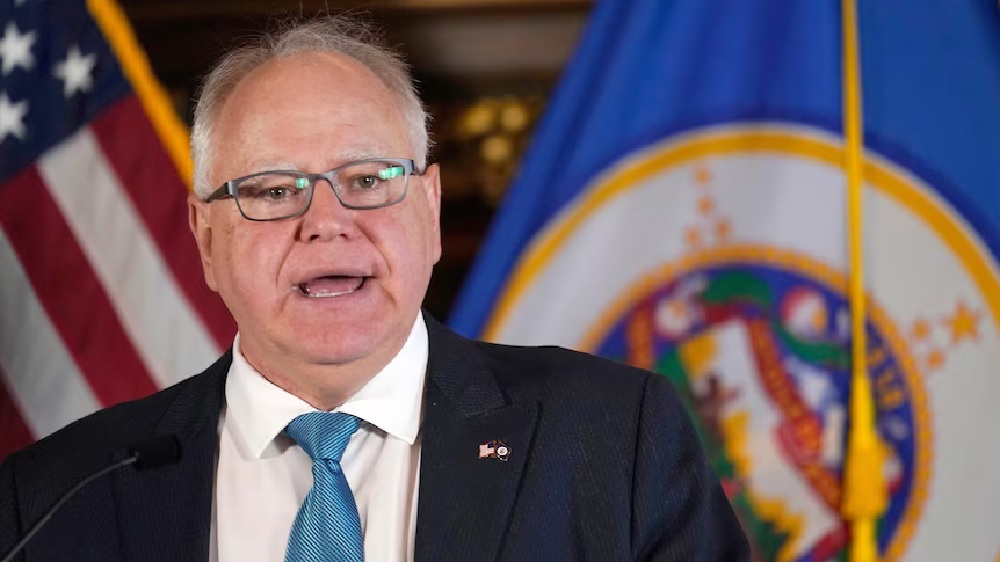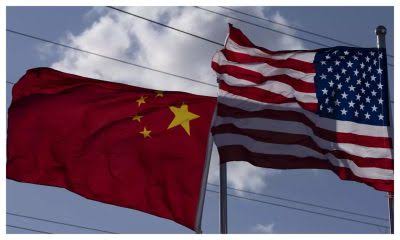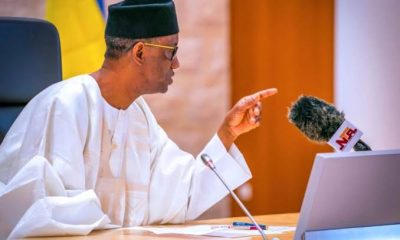Foreign
US Election: Meet Kamala Harris Running Mate, Tim Walz And What You Should Know About Him

Kamala Harris has chosen Minnesota Governor Tim Walz, a former school teacher and member of Congress, as her vice-presidential nominee.
The two-term Democratic governor was tapped by U.S. Vice-President Kamala Harris to be her presidential campaign running mate on Tuesday, ending an accelerated search for a vice-presidential candidate as the race to the White House heats up.
He is viewed as somebody who can win over rural and working-class voters, particularly in crucial Midwestern US states.
The choice of Walz, 60, came after he quickly emerged as a leading messenger for Democrats, portraying liberal policy positions in a common-sense manner that may appeal to Midwestern voters whose support Harris needs to win the presidency.
Mr. Walz will appear with Ms. Harris later on Tuesday at a campaign event in Philadelphia, Pennsylvania before the pair begin a five-day tour of other key battleground states.
They will also speak at the Democratic National Convention later this month, from 19 to 22 August in Chicago, when the Harris-Walz ticket will be made formal.
Below are a few things to know about Tim Walz:
He’s also credited as the first to label Republican candidates Donald Trump and JD Vance as “weird,” which has caught fire among the Harris campaign and Democrats in general.
“He’s a pretty safe choice,” said Matthew Lebo, a political science professor at Western University who studies American politics.
“He’s very down to earth and can explain liberal values and what the government’s priorities should be in a way that talks about the social safety net and helping people build their lives, as opposed to ‘we’re taxing you more.’”
Walz’s state also shares a 885-kilometer border with Canada — and a trade economy worth billions of dollars every year.
Walz was born in West Point, Neb., a community of about 3,500 people northwest of Omaha. Walz joined the Army National Guard and became a teacher in Nebraska.
He and his wife Gwen moved to Mankato in southern Minnesota in the 1990s, where he continued his teaching career and coached high school football.
Walz served 24 years in the Army National Guard before retiring from a field artillery battalion in 2005 as a command sergeant major, one of the military’s highest enlisted ranks.
He entered politics in 2006 by defeating a six-term Republican incumbent, Gil Gutknecht, for a seat in the U.S. Congress, first displaying his ability to connect with conservative voters. He also capitalized on anger towards then-president George W. Bush and the Iraq War.
During his own six terms in the House of Representatives, Walz became known as a champion of veterans issues. He won praise for helping to reach a bipartisan consensus for veterans’ health and education benefits during Trump’s divisive term.
When he successfully ran for the Minnesota governorship in 2018, he portrayed Democratic ideals like union organizing, workers’ rights, and a higher minimum wage in ways that appealed to rural middle-class voters who otherwise vote Republican.
“He’s a hunter but understands the sense of gun laws. He is liberal in terms of a wider social safety net.”
As governor, Walz has sought to further deepen economic ties with Canada, which is the state’s largest trading partner by far.
In June, Walz traveled to Canada with an economic and agricultural delegation that sought to promote their state as a trade and investment destination. Canada and Minnesota each have more than 60 companies operating within each other’s borders, employing thousands of local workers.
Walz met with Ontario Premier Doug Ford at Queen’s Park during the trip, and Ford highlighted the “billions of dollars in two-way trade” between their economies and the need to “protect and grow” those ties.
Foreign
China retarliates with 84% tarrifs on US products from 12midnight

China will impose 84 percent tariffs on US imports, up from 34 percent, the finance ministry said Wednesday, hours after similar levies by the United States came into force.
US President Donald Trump’s latest salvo of tariffs came into effect on dozens of trading partners Wednesday, including punishing 104 percent duties on imports of Chinese products.
Beijing has consistently opposed tariff rises and said Wednesday it would take “firm and forceful” steps to protect its interests.
Its finance ministry later said in a statement that “additional tariff rates” on imports originating in the United States would “rise from 34 percent to 84 percent”, effective from 12:01 pm on Thursday.
“The tariff escalation against China by the United States simply piles mistakes on top of mistakes (and) severely infringes on China’s legitimate rights and interests,” the ministry said.
Washington’s moves “severely damage the multilateral rules-based trade system”, it added.
In a separate statement, Beijing’s commerce ministry said it would blacklist six American artificial intelligence firms, including Shield AI Inc. and Sierra Nevada Corp.
The companies had either sold arms to Taiwan or collaborated on “military technology” with the island, the commerce ministry said.
Foreign
EU says it prefers negotiations, but proposes first tariffs on US imports

The European Commission said on Monday it had offered a “zero-for-zero” tariff deal to avert a trade war with U.S. President Donald Trump as EU ministers agreed to prioritise negotiations, while striking back with 25% tariffs on some U.S. imports.
The 27-nation bloc faces 25% import tariffs on steel and aluminium and cars and broader tariffs of 20% from Wednesday for almost all other goods under Trump’s policy to hit countries he says impose high barriers to U.S. imports.
On Monday evening, the Commission proposed its first retaliatory tariffs at 25% on a range of U.S. imports in response to Trump’s steel and aluminium tariffs rather than the broader levies.
However, the list was shortened after the EU executive bowed to pressure from member states and removed bourbon, wine and dairy after Trump threatened a 200% counter-tariff on EU alcoholic drinks. France and Italy, major exporters of wine and spirits, were particularly concerned.
EU trade chief Maros Sefcovic said earlier on Monday the retaliation would impact less than the previously announced 26 billion euros ($28.4 billion). The tariffs for most of the goods will go into effect May 16 and some from December 1.
Ministers overseeing trade met in Luxembourg on Monday to debate the EU’s response and discuss relations with China. Many said the priority was to launch negotiations to remove Trump’s tariffs, rather than fight them.
Michal Baranowski, deputy economy minister of Poland, told a press conference after the meeting that his EU counterparts did not want to be “trigger-happy”.
Sefcovic said discussions with Washington were at an early stage and that he had offered “zero-for-zero” tariffs for cars and other industrial products, expressing hope that discussions could begin.
However, Trump’s top trade adviser on Monday dismissed tech-billionaire Elon Musk’s push for “zero tariffs” between the U.S. and Europe, calling the Tesla CEO a “car assembler” reliant on parts from other countries.
“While the EU remains open to – and strongly prefers – negotiation, we will not wait endlessly,” Sefcovic said, adding the bloc would push ahead with countermeasures and steps to avoid floods of diverted imports.
The EU is set to approve the first retaliatory measures this week. The bloc will start collecting the tariffs on April 15, with a second tranche starting a month later.
The removal of bourbon from the list of items subject to the EU’s retaliatory tariffs on U.S. imports “would be great news, and we are hopeful this is the case,” said Chris Swonger, chief executive of the Distilled Spirits Council of the United States. “It would be the first step toward getting the U.S.-EU spirits sectors back to zero-for-zero tariffs and untangling distilled spirits products from these wider trade disputes.”
EU KEEPS ALL RETALIATION OPTIONS OPEN
The bloc is expected to produce a larger package of countermeasures by the end of April, as a response to U.S. car and broader tariffs.
Sefcovic said the EU was ready to consider all retaliatory options. One is the EU’s Anti-Coercion Instrument, which allows it to target U.S. services or to limit U.S. companies’ access to EU public procurement tenders.
“We are prepared to use every tool to protect (the) single market,” he said, echoing the views of French Trade Minister Laurent Saint-Martin.
In a war of tariffs on goods, Brussels has less to target than Washington, given EU goods imports from the U.S. totalled 334 billion euros ($366.2 billion) in 2024, against 532 billion euros of EU exports to the U.S.
Some EU countries, particularly those exposed to trade with the United States, urged caution. Irish Foreign Minister Simon Harris described the Anti-Coercion Instrument as “very much the nuclear option.”
Baranowski of Poland said EU members were willing to keep options open, with a stress on proportionality.
“There were various ideas put on the table. Some countries mentioned services. Others didn’t. Some countries mentioned digital services, others didn’t,” he said.
Outgoing German Economy Minister Robert Habeck said the EU should realise it was in a strong position – if it was united.
“The stock markets are already collapsing and the damage could become even greater … America is in a position of weakness,” he said in Luxembourg.
Foreign
British MPs return to London after Israel deportation

Two Labour MPs say they are “astounded” to have been denied entry to Israel while on a trip to visit the occupied West Bank.
Abtisam Mohamed and Yuan Yang said it was “vital” parliamentarians were able to witness the situation in the occupied Palestinian territory first-hand.
They were refused entry because they intended to “spread hate speech” against Israel, the nation’s population and immigration authority said.
Foreign Secretary David Lammy criticised Israeli authorities, describing the move as “unacceptable, counterproductive, and deeply concerning”.
But Conservative leader Kemi Badenoch said Israel had a right to “control its borders”, adding it was “significant” there were Labour MPs other countries did not want to let in.
Yang, the MP for Earley and Woodley, and Mohamed, the MP for Sheffield Central, flew to Israel from London Luton Airport with two aides on Saturday afternoon.
The Israeli immigration authority said Interior Minister Moshe Arbel denied entry to all four passengers after they were questioned. It accused them of travelling to “document the security forces”.
The Israeli embassy in London said in a statement on Saturday that the country “will not allow the entry of individuals or entities that act against the state and its citizens”.
It said Mohamed and Yang had “accused Israel of false claims” and were “actively involved in promoting sanctions against Israeli ministers”.
It also said they had supported campaigns aimed at boycotting the country “at a time when Israel is at war and under attack on seven fronts”.
The UK Foreign Office said the group was part of a parliamentary delegation. However, Israel’s immigration authority said the delegation had not been acknowledged by an Israeli official.
The Israeli embassy said the MPs “were offered hotel accommodation, which they declined” and the cost of their return flight to the UK was covered.
Israel’s Interior Ministry said the MPs left the country early on Sunday.
Mohamed and Yang said their trip had been organised with UK charities that had “over a decade of experience in taking parliamentary delegations”.
“We are two, out of scores of MPs, who have spoken out in Parliament in recent months on the Israel-Palestine conflict and the importance of complying with international humanitarian law,” the MPs said in a joint statement.
“Parliamentarians should feel free to speak truthful in the House of Commons, without fear of being targeted.”
Lammy said the Foreign Office had been in touch with both MPs to offer support, adding: “I have made clear to my counterparts in the Israeli government that this is no way to treat British parliamentarians.”
The Council for Arab-British Understanding and Medical Aid for Palestinians – the latter of which is a registered UK charity – said in a joint statement that they had organised the trip.
“This visit was part of that long-standing programme,” they said.
“When questioned, the group was clear, open and transparent about the aims and objectives of the visit, which included visiting a range of projects run by humanitarian and development organisations operating in the West Bank.
“The group had informed the UK consul general in Jerusalem of their visit and was planning to meet with them as part of the itinerary.”
Both Yang and Mohamed – who were first elected in 2024 – have made several interventions on the Israel-Hamas conflict in Parliament.
In February, Mohamed initiated a cross-party letter, signed by 61 MPs and lords, calling for a ban on goods from Israeli settlements on Palestinian territory, citing an opinion from the International Court of Justice (ICJ).
She has also criticised Israel for withholding humanitarian aid from Gaza, telling the House of Commons in October that international law “prohibits the starvation of civilians as a method of warfare”, and has mentioned humanitarian organisations’ claims of “ethnic cleansing” in Gaza.
In January, Yang spoke in favour of bringing sanctions against Israeli ministers Itamar Ben-Gvir and Bezalel Smotrich, after they suggested building Israeli settlements in northern Gaza to encourage Palestinians to leave.
She has also highlighted the dangerous conditions journalists and medical professionals face while in the Palestinian territory.
When asked about Israel’s decision, Conservative leader Kemi Badenoch told the BBC’s Sunday with Laura Kuenssberg that countries “should be able to control their borders”.
“What I think is shocking is that we have MPs in Labour [who] other countries won’t allow through,” Badenoch said. “I think that’s very significant.”
Her comments were rebuffed by Emily Thornberry, the Labour chair of the foreign affairs select committee, who described Yang and Mohamed as “highly respected parliamentarians” and “potential leaders”.
“Israel is badly advised to try and alienate them, to humiliate them and to treat them in this way,” she told the programme.
“I think that it’s an insult to Britain and I think it’s an insult to Parliament.”
Sir Ed Davey accused Badenoch of “yet another complete shocker”.
The Liberal Democrat leader said she “has once again shown unbelievably poor judgement by failing to back two British MPs denied entry to Israel”.
Lammy called Badenoch’s comments “disgraceful”, asking her: “Do you say the same about Tory MPs banned from China?”
During the war in Gaza, there have been protests, violent incidents and raids by Israeli forces in the West Bank. Hundreds of deaths have been reported there.
Israeli troops have been engaged in an extended operation in the occupied Palestinian territory, where two Palestinians were killed on Friday.
The current war began on 7 October 2023, when Hamas fighters launched a surprise attack on Israel, killing around 1,200 people and taking 251 hostages back to Gaza.
Since then, Gaza’s Hamas-run health ministry says more than 50,000 people have been killed. It said 1,309 people have died since a ceasefire ended on 18 March.
Lammy said: “The UK government’s focus remains securing a return to the ceasefire and negotiations to stop the bloodshed, free the hostages and end the conflict in Gaza.”
-

 News12 hours ago
News12 hours agoBanditry:” I was chained for 32days while in their den, killed my wife as I watch-Nat’l Assembly DD narrates experience
-

 News8 hours ago
News8 hours agoPolice Inspector Slumps, Dies While Celebrating After Arsenal Wallop Real Madrid 3-0
-

 News13 hours ago
News13 hours agoUS revokes more than 500 foreign student visas
-

 News19 hours ago
News19 hours agoBandits have seized control of 64 communities in Plateau – Gov Muftwang
-

 News15 hours ago
News15 hours agoIbas picks administrators for 23 Rivers LGs(SEE list)
-

 Economy19 hours ago
Economy19 hours agoMobile Money transactions hit $1.68trn in one year
-

 News20 hours ago
News20 hours agoRibadu warns against ransom payment to terrorists, kidnappers, others
-

 News7 hours ago
News7 hours agoSAD! APC lawmaker dies while asleep





